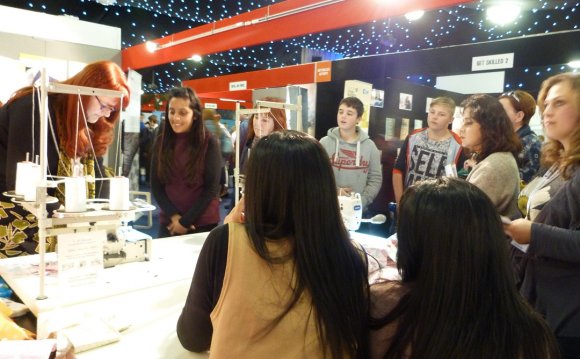
 Textiles are made of a wide range of normal and synthetic fibers.
Textiles are made of a wide range of normal and synthetic fibers.
Pictures
The modern textile business provides a diverse variety of career possibilities from recycleables processing towards the design of apparel and furnishings. Historically, the textile industry has been a significant employer of unskilled work in newly industrializing areas and nations. These jobs have actually migrated from industrialized nations to building countries where work costs are reduced. These days, the U.S. textile industry competes in a globalized market available quality products at affordable prices. Textile businesses are smaller than they were some decades ago, and need specific design, business and technical skills to participate globally.
Textile Tech
Textile technology may be the handling of a natural product – natural products like wool and cotton, or synthetics like plastic and acrylics – into yarn, thread and textile. It requires building brand-new colors, designs and properties like liquid and fire resistance. The last item can be used in stylish clothing, defensive clothing, or furniture for furnishings, automobiles, and aircraft. Textile technology is taught as an undergraduate training course in U.S. universities. Other qualifications might be science majors in chemistry, physics or manufacturing, along with a master’s in textile technology. Job applicants needs the feeling of working in a textile mill – as a summer getaway or entry-level task – to comprehend just how a mill plus the material manufacturing system work. A first-line supervisor or manager received an average $48, 830 last year, based on the Bureau of work Statistics.
Eco Materials
Fiber science is a branch of textile technology this is certainly developing into a different control through the interest in eco fibers. Ecological concerns and durability issues have caused a consumer desire for brand new forms of all-natural materials predicated on bamboo, hemp, nettles, eucalyptus and coconut husks. Some make use of milk proteins. The mechanical and chemical recycling of left over fabrics or factory and customer waste into materials is an evergrowing analysis discipline. There are job opportunities inside textile and manner sectors plus in academic study for majors in chemistry, physics, biology and botany and ecological studies.
Supply Administration
The fashion business modifications rapidly. a style line could be out of stock in under per month, and successful stores must alter their particular stock at short notice. So a textile producer must use individuals with the business skills necessary to handle the availability of recycleables or finished material. The business’s stock, raw product offer and buyer requests needs to be been able to guarantee a simple yet effective offer sequence. Irrespective of fashion, exactly the same maker could have consumers within the fixtures or industrial sectors where demand uses various styles. Supply administration is a job for business students and MBAs with exceptional computer software skills. An awareness of preferred style trends is vital. Based on the Institute of provide Chain Management, the typical 2011 salary for offer sequence professionals was $103, 664.
Textile Design
Developers would be the designers of the textile business, producing habits and textures to be incorporated into fabrics. They may be able work with the fashion sector or perhaps in interior design, producing materials for furnitures. Some in the course of time work with fashion design itself. An excellent arts major is the greatest starting point because of this profession. Combine this with familiarity with computer-aided design, or CAD, practices, as well as knowledge of art and costume record which can be used as motivation. In accordance with the Bureau of work Statistic, 2010 median yearly purchase manner manufacturers had been $64, 530.









